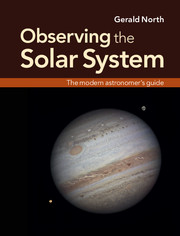Book contents
- Frontmatter
- Contents
- Preface
- Acknowledgements
- Chapter 1 Earth and sky
- Chapter 2 Moon and planet observer's hardware
- Chapter 3 The Solar System framed
- Chapter 4 Stacking up the Solar System
- Chapter 5 Our Moon
- Chapter 6 Mercury and Venus
- Chapter 7 Mars
- Chapter 8 Jupiter
- Chapter 9 Saturn, Uranus and Neptune
- Chapter 10 Small worlds
- Chapter 11 Comets
- Chapter 12 Our daytime star
- Appendix 1 Telescope collimation
- Appendix 2 Field-testing a telescope's optics
- Appendix 3 Polar alignment
- Index
Chapter 6 - Mercury and Venus
Published online by Cambridge University Press: 05 November 2012
- Frontmatter
- Contents
- Preface
- Acknowledgements
- Chapter 1 Earth and sky
- Chapter 2 Moon and planet observer's hardware
- Chapter 3 The Solar System framed
- Chapter 4 Stacking up the Solar System
- Chapter 5 Our Moon
- Chapter 6 Mercury and Venus
- Chapter 7 Mars
- Chapter 8 Jupiter
- Chapter 9 Saturn, Uranus and Neptune
- Chapter 10 Small worlds
- Chapter 11 Comets
- Chapter 12 Our daytime star
- Appendix 1 Telescope collimation
- Appendix 2 Field-testing a telescope's optics
- Appendix 3 Polar alignment
- Index
Summary
Mercury and Venus are known as inferior planets because they orbit closer to the Sun than the Earth does. As a consequence of this they never appear very far from the brilliant solar orb in our skies. Innermost Mercury is particularly Sun-hugging. So, a bit before sunrise or a little after sunset is the only time we have any chance of seeing these planets against a dark sky. Adding to the problems, the ecliptic plane – and the planets stay close to the ecliptic plane – can sometimes intersect the horizon at a rather shallow angle. At those times the best we can do is to catch a glimpse of the planet as it appears low over the horizon, twinkling through the greatest thickness of the Earth's unsteady atmosphere. So, these worlds are not the easiest targets for our telescopes.
STELLAR AND PLANETARY BRIGHTNESSES
The apparent visual magnitude of any celestial body is a measure of how bright it appears to be in our sky. The magnitude scale can cause confusion to the uninitiated because the larger positive number actually corresponds to the dimmer object.
- Type
- Chapter
- Information
- Observing the Solar SystemThe Modern Astronomer's Guide, pp. 157 - 196Publisher: Cambridge University PressPrint publication year: 2012



